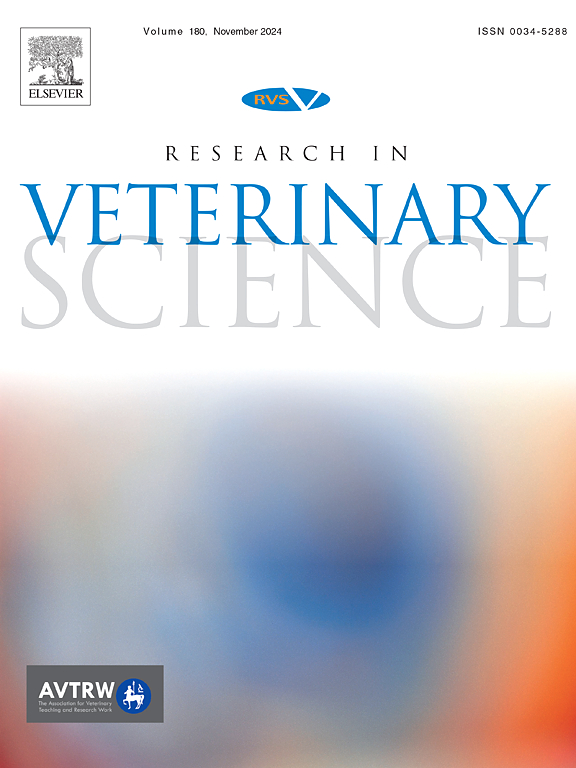添加噬菌体对坏死性肠炎肉鸡生产性能、肠道健康和血液生化的影响
IF 1.8
3区 农林科学
Q1 VETERINARY SCIENCES
引用次数: 0
摘要
坏死性肠炎(NE)主要由G型产气荚膜梭菌(CP)引起,对肉鸡的健康和生产性能构成重大威胁,特别是在抗生素限制的生产系统中。噬菌体治疗正在成为控制家禽肠道病原体(包括CP)的一种有前景的替代抗生素。然而,在实际条件下,在具体确定噬菌体联合益生菌对肉仔鸡与NE相关的CP菌株的体内作用方面,存在一个关键的知识缺口。因此,本研究旨在评估一种噬菌体制剂(PathoGone™-DWA;含有枯草芽孢杆菌+噬菌体鸡尾酒),通过饮用水给药。试验选用1日龄(Ross-308)雄性雏鸡576只,随机分为4个处理(6圈/ 24只):(1)阴性对照;(2)阳性对照(PC;(3)低剂量噬菌体(LD-BP);(4)高剂量噬菌体(HD-BP;感染+1.2 g/笔/天)。第15天,禽类口服10×球虫疫苗(1 mL/只),随后口服G型产气荚膜衣原体致病性(netb阳性)现场菌株(1 mL;1 × 108 CFU/mL/只),第19、20天。添加噬菌体可显著提高采食量、增重和饲料系数(P <;0.05),同时降低肠道病变评分和死亡率。空肠组织形态学和血液学指标显示明显的恢复(P <;0.05)与ne相关的肠道损伤和血液异常。血清生化指标也有明显改善(P <;0.05)蛋白质、葡萄糖、脂质谱、肝酶和肾脏标志物。综上所述,补充噬菌体(PathoGone™-DWA)显著改善了netb阳性CP肉鸡的生产性能指标,减轻了肠道损伤,恢复了血液学和生化紊乱,突出了其作为一种靶向、无抗生素干预NE的功效。本文章由计算机程序翻译,如有差异,请以英文原文为准。
Effects of bacteriophage supplementation on performance, gut health and blood biochemistry in broilers challenged with necrotic enteritis
Necrotic enteritis (NE), primarily caused by Clostridium perfringens (CP) type G, poses a significant threat to broiler health and performance, especially in antibiotic-restricted production systems. Bacteriophage therapy is emerging as a promising alternative to antibiotics for controlling enteric pathogens in poultry, including CP. However, a critical knowledge gap exists in specifically determining the in vivo effects of bacteriophages combined with probiotics against CP strains associated with NE in broilers under practical conditions. Therefore, this study aimed to evaluate the efficacy of a bacteriophage preparation (PathoGone™-DWA; containing Bacillus subtilis + Phages cocktail) administered via drinking water in NE-challenged broilers. In total, 576 one-day-old (Ross-308) male chicks were randomly assigned to four treatments (6 pens of 24 birds): (1) Negative Control (NC; uninfected + basal diet), (2) Positive Control (PC; infected + basal diet), (3) Low Dose Bacteriophage (LD-BP; infected +0.6 g/pen/day), and (4) High Dose Bacteriophage (HD-BP; infected +1.2 g/pen/day). Birds were orally predisposed with 10× coccidia vaccine (1 mL/bird) on day 15, followed by oral inoculation with a pathogenic (NetB-positive) field strain of C. perfringens type G (1 mL; 1 × 108 CFU/mL/ bird) on day 19 and 20. Bacteriophage supplementation significantly improved feed intake, body weight gain, and feed conversion ratio (P < 0.05), while reducing intestinal lesion scores and mortality. Jejunal histomorphology and hematological indices depicted a notable restoration (P < 0.05) of NE-associated gut damage and blood abnormalities. Serum biochemistry also showed marked improvement (P < 0.05) in protein, glucose, lipid profile, liver enzymes, and renal markers. In conclusion, bacteriophage supplementation (PathoGone™-DWA) significantly improved performance metrics, mitigated intestinal damage, and restored hematological and biochemical disturbances in broilers challenged with NetB-positive CP, highlighting its efficacy as a targeted, antibiotic-free intervention against NE.
求助全文
通过发布文献求助,成功后即可免费获取论文全文。
去求助
来源期刊

Research in veterinary science
农林科学-兽医学
CiteScore
4.40
自引率
4.20%
发文量
312
审稿时长
75 days
期刊介绍:
Research in Veterinary Science is an International multi-disciplinary journal publishing original articles, reviews and short communications of a high scientific and ethical standard in all aspects of veterinary and biomedical research.
The primary aim of the journal is to inform veterinary and biomedical scientists of significant advances in veterinary and related research through prompt publication and dissemination. Secondly, the journal aims to provide a general multi-disciplinary forum for discussion and debate of news and issues concerning veterinary science. Thirdly, to promote the dissemination of knowledge to a broader range of professions, globally.
High quality papers on all species of animals are considered, particularly those considered to be of high scientific importance and originality, and with interdisciplinary interest. The journal encourages papers providing results that have clear implications for understanding disease pathogenesis and for the development of control measures or treatments, as well as those dealing with a comparative biomedical approach, which represents a substantial improvement to animal and human health.
Studies without a robust scientific hypothesis or that are preliminary, or of weak originality, as well as negative results, are not appropriate for the journal. Furthermore, observational approaches, case studies or field reports lacking an advancement in general knowledge do not fall within the scope of the journal.
 求助内容:
求助内容: 应助结果提醒方式:
应助结果提醒方式:


